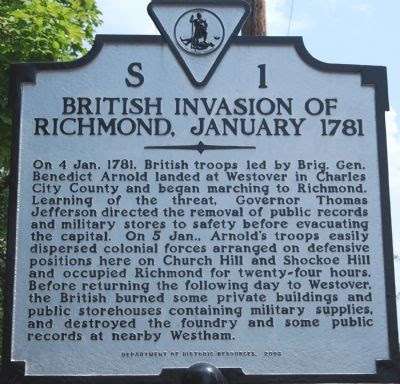A Call to Arms
The many intricacies of Lieutenant Elisha White's life did not end with his being arrested, removed from company command, and serving as a Continental Army Recruiting Officer in Virginia. To add to the many mysteries surrounding Elisha's life, he left a most unusual will dated January 4, 1781 in Henrico County, Virginia comprised of only two sentences:
Henrico County, VA Will Book 1 page 10
In the name of God amen. January 4th 1781
I, Elisha White of Henrico County being in perfect sences do make this my last will and testament.
Itum to my wife Theodotia White I do give and bequeath all my estate real and and personly after my debts being out the same.
Test Elisha White Junr
Baldwin Rocket this being my last will & testament
Ann Cowley SS
Abraham Cowley Junr
Isn't the brevity of Elisha's will puzzling? His wording was so succinct and he left out some important language of the day which was almost always used when writing one's will. In 1781, it was common practice for a will to include a commending of one's soul to "Almighty God", and usually there was mention of being buried in a "decent manner". The wording certainly indicates that Elisha was in a great hurry, with little or no time to spare other than to identify his wife, "Theodotia", as his sole and legal heir.
However, the language following his will stated that it wasn't proven in court until November, almost eleven months later! No, Elisha wasn't on his deathbed when he wrote his will. Rather, he was in an extreme hurry to go somewhere that was potentially fatal to his life. Where was he going? What happened on January 4, 1781 in Henrico County which prompted the writing of such a will? Well, that was the day that the startling news arrived that a British fleet had landed at Westover on the James River and was headed to invade Richmond!
Sketch of the Skirmish at Richmond on January 5th, 1781 on page 306 in the book Historical Collections of Virginia by Henry Howe
The invasion caught the Virginia government and people unprepared. In their book, Richmond During the Revolution, 1775-83, Harry M. Ward and Harold E. Greer Jr chronicled the events leading up to the invasion and how Governor Jefferson scrambled to move public stores and documents out of Richmond, the new capital of Virginia. In addition, a defensive force was needed immediately, so Jefferson issued a call to arms. All able bodied men from the counties of Henrico, Chesterfield, Hanover, Goochland, and Powhatan were called to immediately respond to the aid of Richmond. This emergency calling up of men to defend Richmond and Virginia would have included Elisha. With a British flotilla on the James River, noone was thinking about Elisha's fatal duel with Lieutenant John Green two years before. Elisha was young, an officer, and probably very willing to serve. No longer restricted to the administrative duties of a Recruiting Officer, this call to arms would have allowed Elisha to once again serve in the field.
Many of the men who lived in Henrico County responded to the call by going to Manchester, across the James River, where the arms and ammunition had been moved to in order to keep the British from seizing them. It is estimated that approximately several hundred men converged upon Manchester. But across the river in Richmond where the confrontation with the British army occurred, it is estimated that only about two hundred men arrived, many who had expected to be armed when they arrived.
The available sources for who the men were that responded to the call are scarce at best. To date, no known record identifies Elisha White as being in Richmond or Manchester. But his will tells us he went somewhere dangerous. And it is interesting to note that General von Steuben, Commander in Chief of Virginia's armed forces, was at Valley Forge with Elisha. Perhaps von Steuben remembered Elisha. Surely he would have remembered the fatal duel involving two young officers, with one of them being the son of Colonel Green.
Even more curious is the fact that the day that Elisha's will was proven in the Henrico County court, November 5, 1781, was seventeen days after Cornwallis' surrender at Yorktown. Coincidence? Perhaps not. The invasion of Richmond was the beginning of the British campaign throughout Virginia, with the marauding support of Banastre Tarlton's Legion. The need to defend Virginia never gave up while the British tried to subdue her. Could it be that once Elisha responded to the call of arms to defend Richmond, General von Steuben allowed him to continue to serve in the field?
As with so many of the other important events in Elisha's life, the how, why and when of his death remain a mystery. But given his most unusual will, and the date which that will was proven in court, it seems certain that he died as a patriot with the hopes of restoring his honor.
copyright©2023 Deborah Thurman Park





